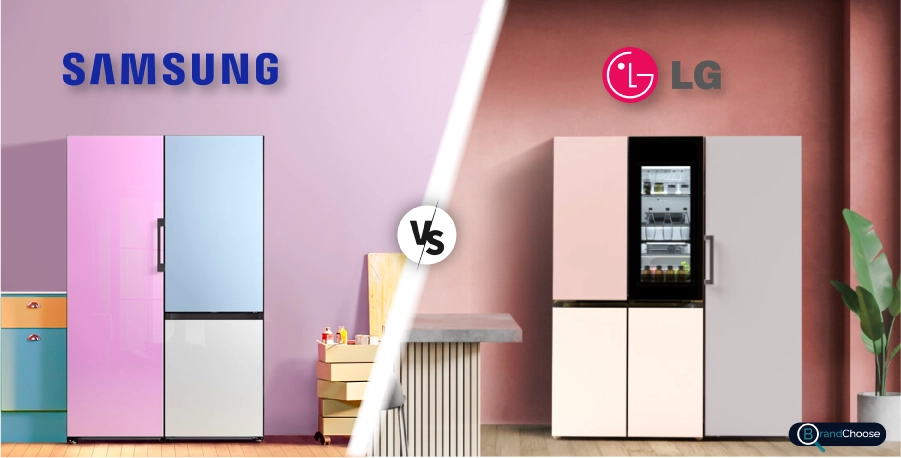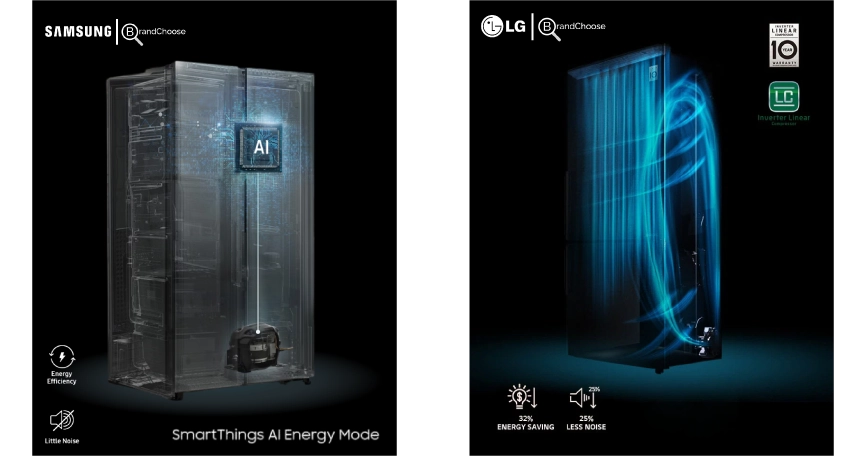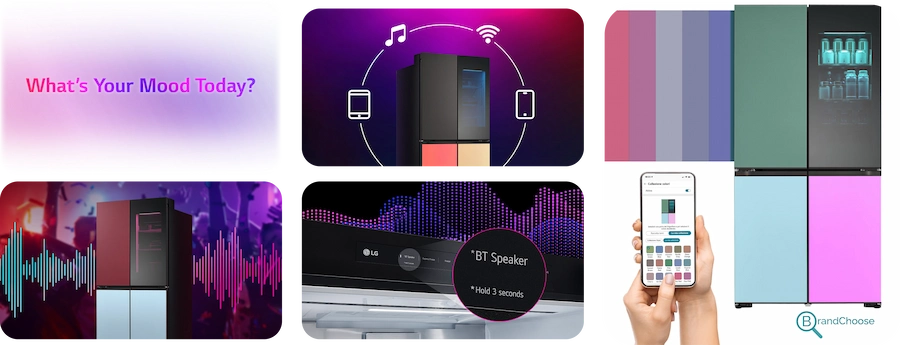Samsung and LG aren’t just competing—they’re shaping the future of refrigeration. These South Korean tech giants have redefined what it means to have a “Smart Fridge,” blending high-end design with AI-driven features, touchscreen controls, and food-preserving innovations. But despite the similar origins, their approaches are wildly different.
Samsung dazzles with bold, smart-first appliances like the Family Hub™, while LG takes a slightly more refined, performance-focused path with ThinQ®, InstaView™, and precision cooling systems. If you're shopping at the cutting edge, these are the two brands to beat.
So which one deserves a place in your kitchen? Let’s break it down.

Affordability
LG offers a broader pricing spectrum. You can find top-freezer models around $900, all the way up to Signature InstaView™ models priced over $4,000. Even mid-range models often include premium features like Door-in-Door®, InstaView™, or ThinQ® app integration—making LG one of the best value brands for feature-packed performance.
Samsung also spans a wide range, but with more emphasis on high-tech. Models like the Family Hub™ fridge with a full touchscreen and SmartThings™ integration can climb past $5,000. That said, Samsung’s side-by-side and French door fridges often undercut LG on price for similar configurations—but without quite as much performance depth.
Winner: – LG wins in affordability with lower prices across most categories, while Samsung is pricier but offers more advanced tech.
Energy Efficiency
Both brands excel here, with most models being ENERGY STAR® certified.
LG edges ahead with its Smart Inverter Compressor, which adapts cooling to your usage patterns. Some of LG’s premium models are up to 20-30% more efficient than standard ENERGY STAR® requirements. You’ll also find Energy Monitoring through the ThinQ® app.
Samsung’s digital inverter compressors are similarly smart and energy-conscious, and newer Family Hub™ fridges allow users to monitor energy use via the SmartThings Energy dashboard. Samsung even includes Power Cool/Power Freeze modes to optimize quick temp adjustments.

Winner: LG – Slightly more efficient and better long-term performance.
Build Quality & Durability
Solid craftsmanship defines both brands, with LG focusing on durable construction across its lineup. Premium models offer tempered glass shelving, metal cooling panels, and stainless finishes that feel high-end. The brand backs its compressors with a 10-year limited warranty, which shows confidence in long-term performance.
Samsung’s build quality is excellent in its mid- and upper-tier fridges, with metal cooling, adjustable FlexZone™ drawers, and sleek finishes. The brand offers a 10-year warranty on compressors but not always on other components.
Winner: LG – Slightly better long-term durability; however, Samsung is still durable.
Products Variety
These Korean giants offer some of the most diverse refrigerator lineups, each featuring smart, tech-forward models that cater to a wide range of needs, preferences, and kitchen styles.
With one of the most diverse refrigerator lineups on the market, LG shines in this category too. From basic top-freezer units to French door, side-by-side, bottom freezer, counter-depth, and even specialty models like the Kimchi refrigerators, there’s something for every layout and lifestyle. Models come in both standard and premium finishes, including stainless, black stainless, and matte options.

LG also brings the MoodUP™ series—a tech-forward line of refrigerators with LED color-changing door panels and Bluetooth speaker integration.

Samsung offers an incredible creative lineup too—especially with its 4-door Flex, Bespoke, and Family Hub™ models. They cover all essentials like French door, side-by-side, top freezer, and bottom freezer options. While you’ll also find counter-depth, full-depth, and garage-ready options. Samsung also brings AI Hybrid, Specialty, and Kimchi refrigerators.

The Bespoke lineup is one of Samsung’s most exciting offerings. They are a highly customizable experience with interchangeable panel colors and finishes, such as glass, stainless steel, and custom options, allowing users to create a fridge that perfectly complements their kitchen’s aesthetic.
The Bespoke series also includes modular designs, meaning you can mix and match different fridge configurations to suit your space and needs.

Winner: Samsung – Takes a slight win with its Bespoke, Flex, Family Hub, and more.
Smart Features, Innovation & Technologies
This is where both brands flex hard.
Here, LG takes a more purposeful approach. Its ThinQ® app allows full remote control and diagnostics, while features like InstaView™ (knock twice to light up the door), Door-in-Door®, Craft Ice™, and Smart Learner adapt cooling to your routines. It doesn’t have a giant screen—but it arguably makes smarter use of the tech behind the scenes.
Samsung leads with its Family Hub™, a touchscreen that lets you view calendars, control smart home devices, stream music, or see inside your fridge via internal AI-integrated cameras. SmartThings™ integration connects with your entire home, and AI-powered features like meal suggestions and expiration reminders make this a tech-lover’s dream.

Winner: Samsung – Bolder smart experience, more innovation at the surface level, though both brands have redefined refrigeration with advanced smart features.
Cooling & Freezing Performance
As for this, LG’s Linear Cooling™, Door Cooling+™, and Multi-Air Flow™ tech work in sync to ensure consistent temperatures and fast recovery after door openings. Add to that the Smart Inverter Compressor and metal back panel cooling, and you’ve got a fridge that delivers precision temp control across compartments.
In this case, Samsung fights back with Twin Cooling Plus™, which separates airflow between fridge and freezer to maintain better humidity and prevent odor transfer. High-end models include Triple Cooling, and the FlexZone™ drawer can convert from fridge to freezer at the touch of a button.
Winner: Tie! – LG for precision, Samsung for flexibility.
| Feature | LG | Samsung |
|---|---|---|
| Cooling Technology | Inverter Linear Compressor, Multi Air Flow DoorCooling+ |
Twin Cooling Plus, Metal Cooling |
| Freezing Technology | Multi Air Flow, Frost-Free | Power Freeze, Power Cool |
| Temperature Control | Stable with Linear Cooling, Even Cooling | Precise Control, Rapid Cooling |
| Humidity Control | Linear Cooling, DoorCooling+ | Twin Cooling Plus |
| Freezer Functionality | Faster freezing, No frost buildup | Power Freeze for quick freezing |
| Food Freshness | Preservation of fresh food, Minimized fluctuations |
Freshness for both compartments, Prevents odor mixing |
Which Brand Is Right for You?
✅ Choose Samsung if you want:
✔️ A fridge that feels like a smart home hub
✔️ Built-in touchscreen, voice assistant, and SmartThings™ control
✔️ Flexible storage with 4-door and FlexZone™ compartments
✔️ Design-forward Bespoke models to match your aesthetic
✔️ A futuristic, connected kitchen experience
✅ Choose LG if you want:
✔️ Energy-efficient cooling with precise temperature control
✔️ Smart features that actually improve performance
✔️ Durability and reliability backed by long warranties
✔️ Great value across all price levels
✔️ Sleek, modern design with fewer moving parts
Related Videos
Conclusion
LG is the smart buyer’s choice for solid cooling, smart control, and long-lasting performance—all at a great value. It doesn’t scream for attention, but it quietly does everything right.
Samsung is for those who want the wow factor. Touchscreen control, AI-assisted food management, and bold design options make it a fridge built for 2025 and beyond. But some of that flair comes at a premium—and potentially at the cost of long-term durability.
If your fridge is a tool, choose LG.
If your fridge is a lifestyle centerpiece, choose Samsung.



















